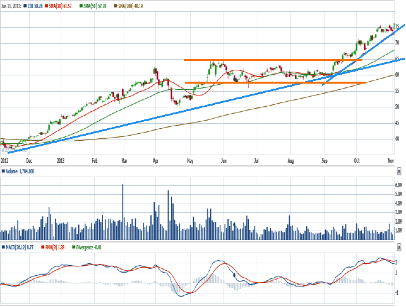We hear a lot of questions about whether the market is “frothy,” or whether additional gains are in the pipeline. And one of the things that differentiates professional from retail traders is their ability to control emotion as stocks move in price. Retail traders tend to let losers run and cut profits short. Professional traders are the opposite.
That’s why it shouldn’t be a concern that equity markets are hitting all-time highs. In fact, Tradespoon’s proprietary trading algorithms continue to identify stocks to go long. Our latest pick: Chicago Bridge & Iron (CBI).
Despite its name, founders of Chicago Bridge & Iron (CBI) reportedly noted that “The old joke is that Chicago Bridge & Iron isn’t in Chicago, doesn’t build bridges and doesn’t use iron.” Instead, CB&I quickly moved into liquid storage, a specialty that has helped it evolve to projects in the red-hot oil and natural gas industry. After hitting a low below $5 per share in the depths of the 2008-2009 market collapse, CBI has gained to close Tuesday at $75.49 – a five-year gain of 509 percent.
Over the past 30 days, CBI has traded between $67.09 and $76.71. On a three-month chart, we can see that the stock has been showing support around $60 per share, which provided a base from June through September. CBI is trading above the 50-Day Moving Average ($70.86), as well as above the 200-Day Moving Average ($62.68).

A LOOK AT FUNDAMENTALS
In addition to the bullish technicals, CBI’s fundamentals also show bullish signs. In the third quarter, CB&I reported that it earned $117.7 million, or $1.10 basic earnings per share ($1.08 diluted earnings per share). That’s up from $80.2 million, or 83 cents basic earnings per share (82 cents diluted earnings per share) for the same quarter last year, a gain of more than 40 percent.
Revenues for the third quarter were $2.99 billion, double the $1.447 billion for the same quarter last year. The 107 percent increase is due primarily to the acquisition of The Shaw Group Inc., while increased construction activities in the Asia Pacific region accounted for a smaller part of revenue gains. Notably, all of the company’s segments recorded increase in revenues in comparison to the same quarter last year.
CB&I’s gross margin was 10.6 percent for the third quarter, down from the 13.1 percent for the corresponding 2012 period. But, that decrease is also due to the acquisition of The Shaw Group. Operating margin was 6.8 percent compared to 8.9 percent for the third quarter of 2012. CBI forecasted Q4 EPS of $1.11 to $1.29 per share, compared to 91 cents in the fourth quarter of 2012.
CB&I does have some work to do to get to industry averages on its balance sheet. CBI has a long-term debt to equity ratio (76.42) much higher than the industry average (21.91). CBI’s trailing P/E ratio of 23.08 above the industry average of 12.98, and above the S&P 500 average of 18.71. CBI’s current Price/Sales of 0.85 is above the average of its industry of 0.38. But, these are not, in and of themselves, a reason that CBI can’t go higher – at least in the near term.
CBI’s head to head comparison to its main competitors shows that the company has second best gross margin, but one below the industry average; however, the company’s operating margin is second to none, and also above the average for the industry. The quarterly revenue growth of the company is much higher in comparison to the growth in revenue of the competition, and it is also above the average of the industry.
When just looking at its main competitors, CBI trades at comparable trailing P/E, but its P/S ratio is still elevated. The company has the lowest (best) PEG ratio of all the competitors, which shows that investors are expecting higher growth in future company’s earnings.
CBI is currently trading below its intrinsic value of $103.82, suggesting that the stock is currently undervalued at these levels. And the majority of the analyst ratings are buy.
OPTIONS STRATEGY RECOMMENDATION
Technical and fundamental indicators both show short-term bullish signals for CBI. Investors should consider the following debit call spread to take advantage of a short-term pop in the price: Buy December 2013 $75 calls and sell the December 2013 $77.50 calls for a net debit of $1.10. We recommend holding until the price reaches $2.20, and note that the price could gain to as high of $2.50 if CBI trades above $77.50 at expiration. The maximum risk is what you pay for the calls, or $1.10.
= = =
“Like” TraderPlanet on Facebook to receive daily market updates and insights.




